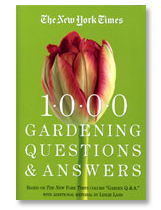Organic Seeds, starting off on the right foot
At first glance, it seems like a no-brainer: If you’re going to be an organic gardener, you ought to plant organic seeds. But it would really be better to say: if you’re going to buy organic products, put organic seeds on your shopping list. For home gardeners, the reason – a very good reason – to choose organic seeds is to support organic agriculture. It has very little to do with the seeds themselves.
Why does this matter? Because it means you can organically grow whatever you want. From the garden’s point of view, one bundle of genetic material is pretty much like another (assuming said bundle is good of its kind and has not been treated with fungicide or otherwise messed-with post harvest).* So although organic seed is preferable when available, insisting on its exclusive use is a little like cutting off your nose in order to spite your face.
In many cases, the organic version is available, especially if it’s a common vegetable. But uncommon heirlooms are another story; vast numbers of interesting flowers have not yet been included, and the number of organically grown hybrids is still mighty petite.
I shall stand back now and wait for the anti-hybrid avalanche to roll by, hating hybrids being all the rage these days. Well, ok. Hybrid seeds cannot be saved from year to year; you have to keep buying new ones.** Like many organic seeds, they are mostly produced by large corporations whose interest in sustainability is entirely market-driven, to the extent that it exists. But this doesn’t make hybrids Darth Vader.
In fact, hybrids bred for disease resistance are an environmental plus when they help you use less biocide. Pesticides and fungicides approved for organic gardening are still a long way from benign.
And while it’s true that a great many hybrids don’t taste very good, flavor having been sacrificed for qualities like heavy cropping and long shelf life, it’s also true that some of the tastiest vegetables in all creation are hybrid varieties: Sun Gold cherry tomatoes, Silver Queen corn, Confection winter squash – we just had some for dinner last night. It was terrific.

Spring is just around the corner, time to get ordering.
For the full seed spectrum: open pollinated, hybrid, conventional and organic, try
Johnny’s Selected Seeds, and Territorial Seeds,
For a good sized list of companies that offer organic seeds, potato sets and garlic bulbs, go to ATTRA, the National Sustainable Agriculture Information Service.
* Seeds from plants that thrived under organic management should produce plants that fare better when grown organically in their turn, but as far as I know there has been no scientific trial of this thesis. It would probably take several generations before any differences were evident and my guess is that even then a grower’s abilities – or lack thereof – would far outweigh any advantage conferred in the seed-production stage. Work is being done to create varieties tailored for organic production ( a very different thing), but this whole branch of plant breeding is still in its infancy.
** Actually, it is sometimes possible to “save” hybrid seeds, essentially by selecting and selecting and selecting again, over several generations of large grow-outs. It’s called stabilizing a hybrid and it’s a lot of work.















The fact is we as human beings worldwide are engaged in an industrial process which may eliminate up to 80% of the world’s genetic diversity in agriculture. The fact is the vast majority of the world’s seeds are not certified organic as yet. If the people of the world eliminate non-organic seeds from their purchase list right now, they will be hastening not helping our collective ability to save our collective genetic heritage. We need diversity to sustain our agriculture. We need it to be chemical free to be safe. Throwing away the diversity just to promote safety does not make sense. In order to survive, we need long enough into the future to have the diversity and organic agriculture. Getting to the future with an organic agriculture and no diversity may not be sustainable. A much better path at this point is to find something new and different that is adapted to your garden whether it is organic or not. Grow it organically. Save the seeds if you can. Rejoin the 10,000 year ritual of seedsaving that made available the diversity we now waste.
Thanks for your sensible comment, Bill. The best path in a nutshell: choose seed that’s adapted to your conditions, which will make it easier to get a good harvest using organic methods. Use said methods. Save seeds (which will henceforth be “organically grown”). Share them with your gardening neighbors and encourage them to go forth and do likewise.
try Genesis Seeds